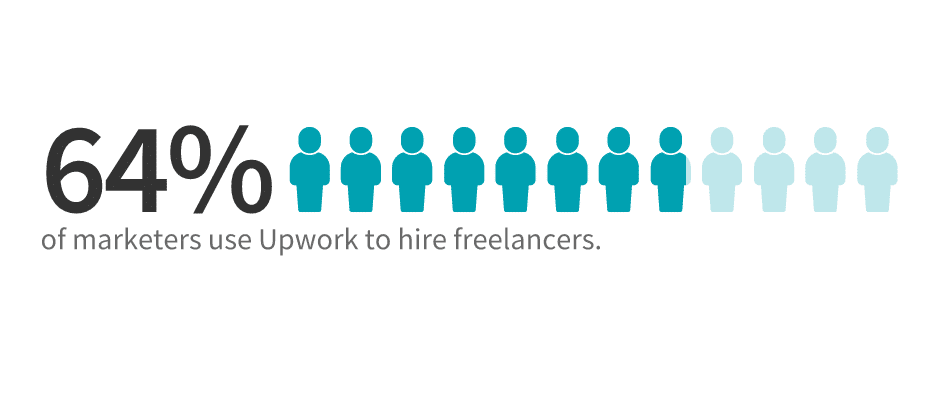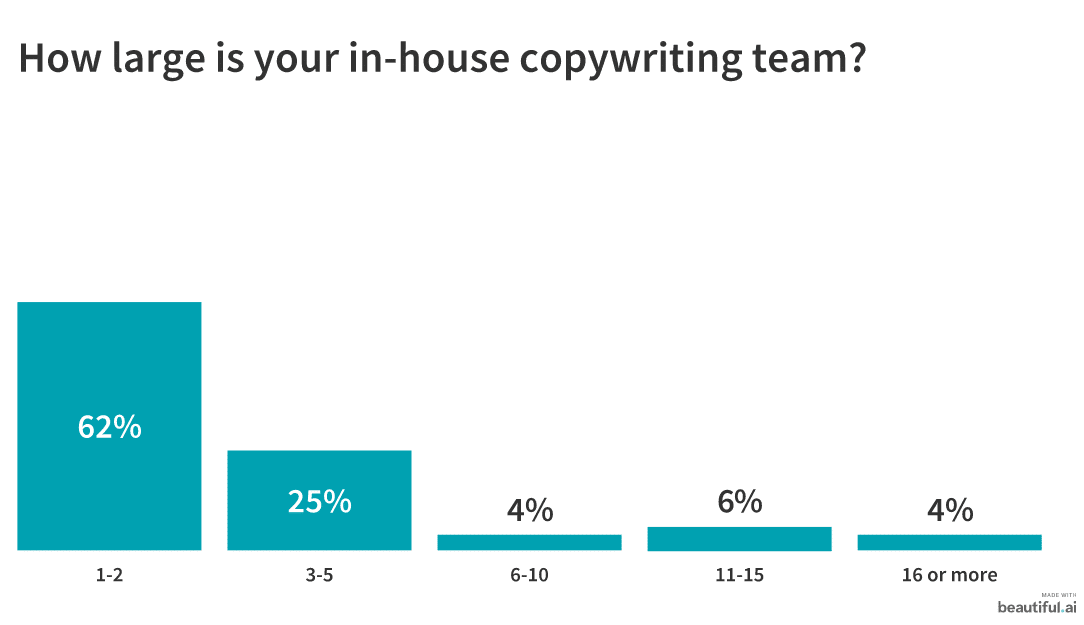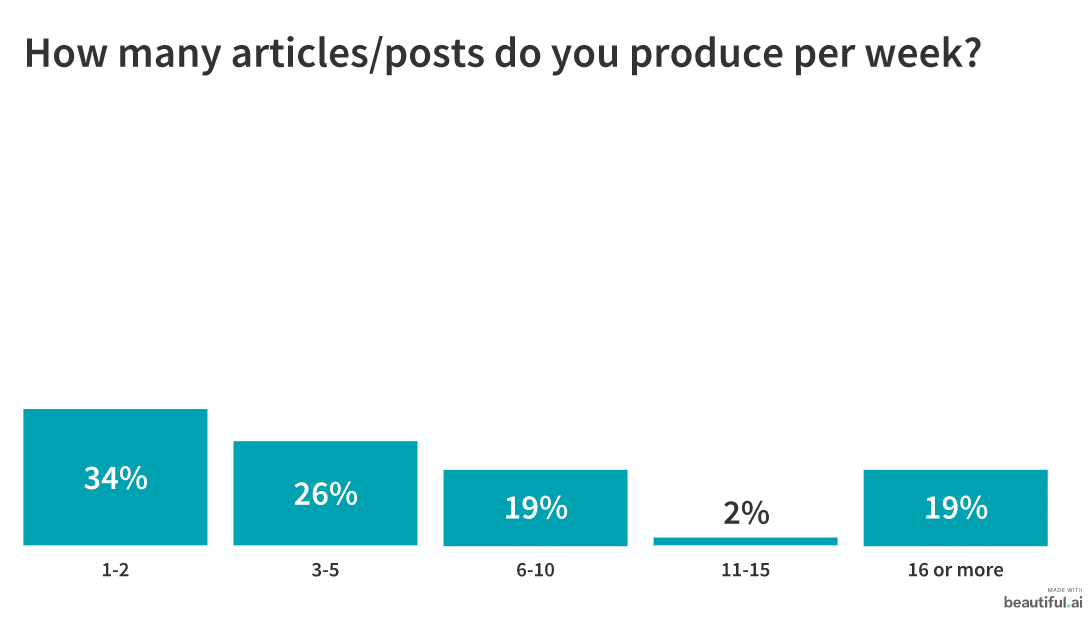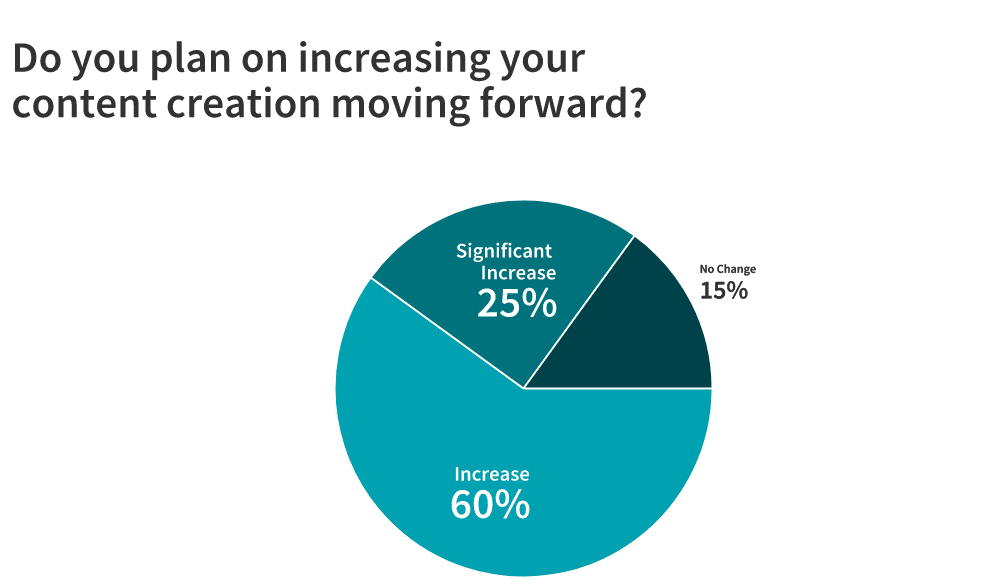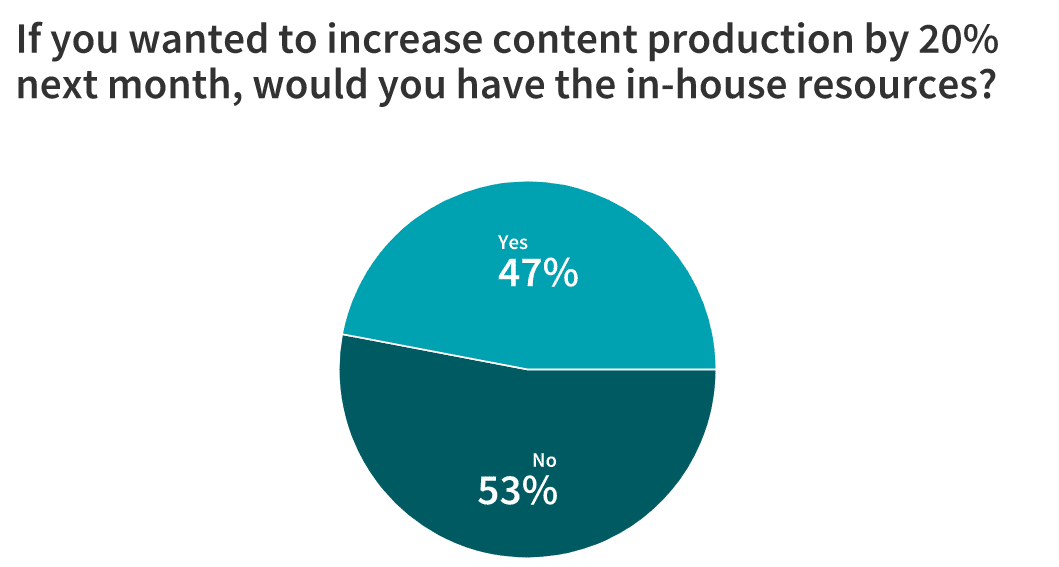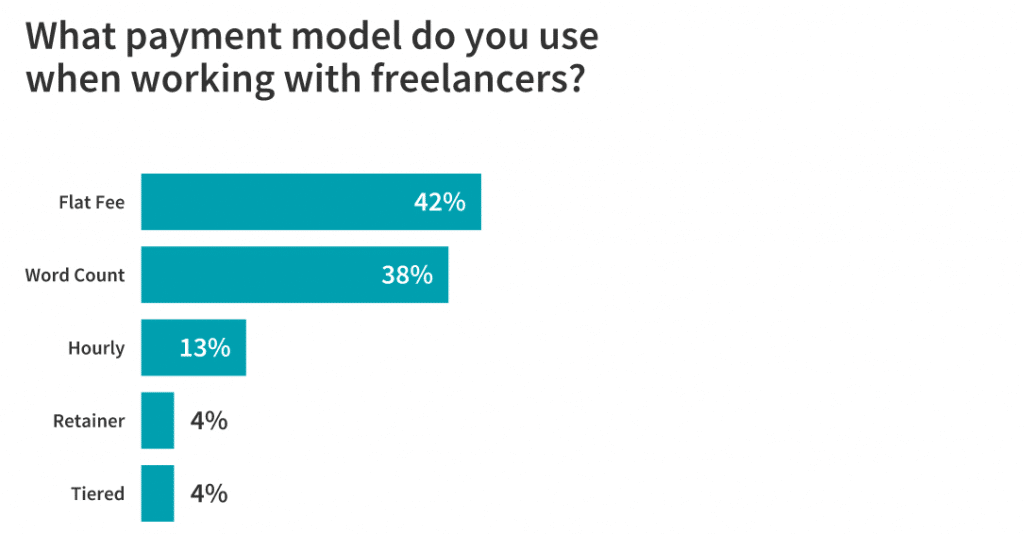It’s obvious that regularly producing quality and authoritative content is an awesome way to increase your expertise in your target audience’s eyes, engage them, and convert them into customers who trust you. And properly optimized content is also a solid method for increasing your ranking on Google.
But when it comes to who should produce that content, the debate rages on. What type of content writer is the better choice for your business – hired employees who serve as your in-house writers, or independent freelancers? Or is the real answer a balance between both types of writers? Determining the best choice for your business is vital, especially to keep up with the content demands of the digital age.
Here at Referral Rock, we were curious to find out how other marketers feel about enlisting the help of freelance writers, so we ran a survey, and 53 marketers shared their insights. Interestingly, 98% of these marketers told us that they’ve used freelancers at least once. We’ll dive into their responses about top advantages and disadvantages of freelancers later in the article. But first, let’s check out the statistics we gathered on content creation.
Finding freelancers? Upwork offers a wealth of options
Finding the right writer for your needs may seem difficult at first, but it’s actually not complicated at all. In fact, if you go to a good writing agency to get the great writing content, you won’t have to do the searching at all because they will take care of it for you. You can be certain that you will be connected to a writer who fits your needs and requirements. And if you are looking for a freelance writer, then comparison sites are great for finding writers.
When we asked marketers where they typically find and hire freelancers, we received over 15 unique answers, testament to the sheer amount of sourcing options out there (marketers were allowed to list all the methods they have commonly used, if they use more than one). The full list can be found in the wordcloud below.
Despite this long list, a few options clearly emerged as the most popular. A majority 64% said they use Upwork to find and hire freelancers, making it the most-used option by a mile. LinkedIn came in second at 19%, Fiverr came in third at 9%, and Freelancer and Indeed tied for fourth at 6% each.
The rest of the methods were mentioned by only one or two marketers. There are a host of great writing services out there, so it’s more of finding the one that fits your needs.
Size of team and content production
To gain some perspective on our marketers’ current content production before asking them about potential increases in content volume, we asked them about the size of their in-house team and the volume of content they create per week.
The majority of marketers we surveyed have a very small in-house copywriting team (which likely increased the odds that they have turned or will turn to freelancers at some point). 62% of marketers say their in-house content team has 1–2 members, and 87% say their team has five members or fewer.
As for articles that the marketers produce per week, 34% say that they produce 1–2 articles per week, 26% said they produce 3–5, 19% produce 6–10 articles, 2% produce 11–15, and 19% produce 16 or more.
Increasing content creation: Freelancers often come through
When we asked marketers whether they plan to increase their content production moving forward, 85% said they do, with 25% of that cohort saying that they plan a significant increase in content production. One of the options we gave marketers on the survey was “decrease,” but no one selected it – the other 15% plan to maintain their current level of content creation. Content is king in marketing, and these numbers clearly show it.
However, it’s clear that many marketers must turn to freelancers, as they simply don’t have the in-house resources to keep up with the Internet’s demands for fresh, constant content.
We asked marketers, “If you wanted to increase content production by 20% next month, would you have the in-house resources?” Just under half said they have the resources in-house, not even close to the 85% who say they want to increase their production at some point. So, if brands want (or need) to increase their content output rapidly, freelancers are a must.
Content budget and compensating freelancers
Marketers shared the percentage levels of their budgets that they dedicate to content creation. 56% dedicate 15% or less of their budget to content creation, while 44% dedicate more than 15% of their budget; the full breakdown is below.
Freelancers work well for all budgets, even the smallest, as there’s plenty of flexibility in how they are paid.
About 42% of marketers told us that they pay freelancers a flat fee, a single payment for a project or group of projects, making it easy for any business to set a budget and choose a freelancer who fits the budget.
Another 38% of marketers pay based on word count, making it the second most popular option – and it’s another fairly easy option to estimate and control your budget. Of course, it’s also a matter of finding quality freelancers who meet the voice and expertise needs for the content you desire.
Biggest benefits of freelancers
To help you decide whether you’ll depend on in-house writers, freelance writers, or both, we asked the marketers to give us their opinions on the biggest benefits and drawbacks of using freelancers. First, let’s examine the benefits – which include flexibility, scalability, niche specialization, and more.
On-demand content to meet your needs
Even when your in-house team is bogged down with responsibilities, freelance writers help you deliver the content you need with a quick turnaround. Hardeep Johar of Stone & Tile Shoppe told us, “When you have in-house copywriters, you need to make sure you consistently supply them with topics and dedicate your time to provide feedback. In some cases, you will find this impossible, and this will mostly result in downtime of your people. Working with freelancers, you get precisely the amount of content that you need and when you need it. In some cases, you will have a team working for you, and then you may have a few months break from content development.”
Monika Adarsh of MobStac shares, “Good freelancers are able to produce quality content from the word go. Given that they are experienced in writing different styles of content, for B2B and B2C, they are capable of delivering a well researched and written blog post. This is especially beneficial when you are looking at content creation in bulk. On the other hand, when hiring an in-house content writer, they have their own learning curve and can produce equivalent or better content after a few weeks. If quick and mass content creation is the aim, then freelancers are the way to go.”
Says Alistair Dodds of Ever Increasing Circles, “Freelancers are an essential support element to our team of writers. In a fast-paced agency world, client briefs can change on a dime. So having a bank of trusted and expert freelance writers you can call on at short notice is an invaluable resource. They work seamlessly with our in-house writers to ensure all briefs are met to deadline. This would not be possible with an all in-house team.”
Ability to find niche specialists at lower costs
Several marketers told us that the biggest benefit of freelancers is their ability to write on specialized, niche topics that your in-house writers may not be familiar with, on a case-by-case basis.
Paige Arnof-Fenn of Mavens & Moguls advises, “You have one chance to make a great first impression. So, if you are launching a business, website, new product or service and you do not have the right expertise in house, then it is time to bring in professionals who can help. Don’t risk diluting your brand or putting your business in a position where it will cost more money and time to get the right words and pictures out there to tell your story. The benefit of bringing in a freelancer is that they are trained professionals who can be very effective communicating essential information quickly.”
According to Nick Galov of Review42.com, “Working with freelancers is a great way to start your content production. I find that the biggest benefit to this is being able to find the right people for your niche. Considering that the geographical location won’t stand in the way of efficient recruitment, you can narrow down the exact expertise, or experiment with the kind of content you’re producing. Hiring freelancers is also cheaper than having an in-house team of writers. All the expenses related to office-keeping, onboarding costs, benefits, etc. can be avoided by hiring freelancers.”
Sam Coppard of Candide reports, “Working with freelancers enables us to produce as much content as we need without the commitment and cost of hiring full-time permanent employees.We can also cover a much wider range of content by commissioning articles from niche experts that we wouldn’t be able to match in house.”
Jack Shepler from Ayokay shares, “The great thing about working with freelancers is that we can choose which writer to work with based on their experience in different writing styles and industry niches. While one writer might be great at writing business-to-business technical copy, another might be better for writing consumer-focused product marketing materials. For many business leaders, writing content sounds like something they can do themselves, but the truth is that often your time is better spent working in your craft, leaving experienced writers to the task of telling your story.”
Tony Mastri of MARION Integrated Marketing attests, “By using freelance writers at an agency, you have the ability to find different subject matter experts. For example, if an in-house writer doesn’t specialize in chemical engineering topics, an online marketplace will have someone with the right background.
Freelance writers are also more flexible when it comes to demand, and can adjust to fluctuations in clients or strategy. In addition, when you find a freelancer that you like, you can work with them on an ongoing basis. You can even negotiate lower prices for your writing jobs if you order a high-enough volume to provide them with steady work.”
Jordan Locke of RevPARTY shares, “We’ve found that using freelance or agency writers allows businesses to realize two huge benefits: learnings from companies other than their own and dedicated expertise before a company can sustain an in-house writer themselves.
Freelance writers often focus on a specific niche and work with multiple clients. This gives them a wealth of experience that you just can’t get from an in-house writer. The freelance writer is seeing the challenges other companies in the space face, different ways to accomplish the same objectives, and solutions that work. They’re exposed to multiple perspectives, companies in different stages of the life cycle, and have a broader view to keep their finger on the pulse of emerging trends.
Experts from Essay Tigers, an academic writing service, state that freelance writers also allow companies to utilize top talent when they may be unable to fully support the hire on their own. Instead of committing to full-time wages or guaranteed hours, companies can get as much or as little time from freelance writers as needed and really tailor their resource allocation to their unique situation. Freelance writers allow companies to have access to quality content at the scale they need at times when they may have to sacrifice quality to afford an in-house writer.”
R.J. Weiss of The Ways to Wealth explains, “As a general personal finance publication, we work within multiple verticals. These include general topics like budgeting and paying off debt, to more complex topics such as travel rewards and student loan forgiveness. Hiring freelance writers has allowed us to find an expert in each of these specific verticals. Therefore,this has let us improve the overall quality of the content.
Rochelle Burnside of Best Company shares, “Freelancers let you source talent worldwide. If the skill or expertise you need can’t be found in your geographical region, then freelancing gives you the option to search a larger pool of talent for your project. The diverse range of abilities and expertise a worldwide database of freelancers can provide will help you find the resources to complete your projects.”
Flexibility
Flexibility was one of the most commonly mentioned benefits of using freelancers. This includes’ freelancers’ ability to free up your in-house team, and how easy it is to adjust freelancers’ production and cut costs.
Roman Zhyvitski of Travel SEO Agency told us, “I’d think the largest benefit when working with freelance copywriters is the flexibility. Whether the company loses clients or has new ones, the copywriters are paid based on number of words anyway, so they simply write less or more and get an appropriate wage. So, this model is scalable.
It is also possible to hire very inexpensive freelancers that you won’t find in your country. It can be much harder with languages that are less popular than English: German, French, Swedish, Dutch. In the case of copywriters in English, the range of them is so wide that you can have freelance writers in different time zones collectively writing 24 hours a day, which is very useful in urgent orders (eg. promos and deals that need to be promoted through content marketing).”
Samuel Johns from Resume Genius shares, “Since we publish a great deal of content, including resume, cover letter, and career tips as well as resume and cover letter samples, we often turn to freelancers to help us create it.
Freelancers can be a godsend, since they free up the rest of our content team for other tasks, like keyword research, competitor analysis, and strategizing about new directions for our content. Once a freelancer has a project to work on, they can devote themselves to it, whereas our in-office workers often have several projects on the go at once — it can be a juggling act to keep on top of everything I’m working on, for example.
Additionally, we tend to assign low-impact pieces to freelancers, while keeping more important articles in house, since our in-house writers tend to have a better feel for our website’s tone as well as our preferred writing style, and it’s crucial that those articles hit the mark.”
Robin Young from Fitness Savvy attests, “The flexibility you get when hiring freelancers is the biggest benefit. If business is slow and you need to cut costs, it’s easy to slow down on content creation. Conversely, when things are busy, you can quickly up the tempo and get high volumes of content out quickly.”
Similarly, Marc Andre of Vital Dollar told us, “Working with freelancers gives you a lot of flexibility. When you have money in the budget or when you need content, you can hire freelancers as needed. And when you need or want to scale up or scale back, it’s very easy to do. And if a writer isn’t meeting your expectations, you can stop working with him/her and move on to another writer.”
Zarar Ameen from CANZ Marketing shares, “When our in-house team is just too busy keeping up with the day-to-day tasks, the pressing need to work on an additional content idea doesn’t pressurize us. We know we have a bunch of talented freelancers we can count on to get the best done, even on short deadlines. Additionally, getting it done using freelancers means we have all our workforce and energies focused on the areas we want. There are no distractions for us, thanks to the freelancers.”
Says Alex Wood from Discourse NYC, “We really enjoy working with freelancers because of the flexibility they add to our content strategy. As we scale it’s easier to add another freelancer than make a comparable in-house hire, and as a small business with office space at a premium having freelancers work remotely is a win for everyone involved.
Working with freelancers is also a great way to bring fresh ideas to our team: because freelancers frequently work across several different industry verticals, they may have an interesting perspective on content our customers would be interested in.”
Jack Lightner of Protect My Car loves freelancers “because they afford you flexibility and industry expertise that are hard to find for in-house copywriters. For example, the content we curate for our email list is jargon heavy. Our in-house copywriting team would struggle to translate some of the language into a form that’s easily digestible by our over 5 million email subscribers. With a freelancer, I can simply head over to LinkedIn and find a former mechanic turned freelancer to expertly translate these insights and provide extreme value to our end user without having to overly burden our in house team.
We see ourselves as an authority in the car space, and an authority has the answers. Our copywriting team can find information – but having an on hand expert is what makes the difference for our readers. Those expert insights are priceless, and add actionable authority to what we’re writing.Considering our goal is always to create the MOST helpful resource possible, there’s no replacing an expert.”
Scalability
Sadi Khan of RunRepeat reports, “It’s the easiest way to scale your content creation and content marketing efforts. We have the in-house writers but there are times when you cannot simply produce enough content in a short period of time. Freelancers can come handy at these times.”
Christine Huegel of Mattress Advisor shares, “When working with freelancers, we’ve found that our productivity and ability to promote content has doubled. If your team members do the necessary work upfront (i.e. write thorough content briefs, set content expectations, vet for quality writers) you can outsource several writing projects to different networks of writers and have a quicker turnover.”
Quincy Smith of Ampjar advises, “You always have the ability to scale if needed assuming you’re working with multiple freelancers – we’ve never had an issue where we needed something written and none of our freelancers wanted more work. However, I have had in house talent not be free due to obligations with other teams.”
Overall reliability after a relationship is built
Daniel Reeves of Dandy Marketing attests, “Once you have an established relationship with a freelancer, they really can become an extension of your team, understand your clients and your needs, eventually, they may not even need a brief! So they are a great resource to lean on when you don’t have the resources in-house, don’t want to write, or don’t know enough about the subject to write a decent piece.”
Says Lorenzo Daminato of Lorenzo Daminato Personal Real Estate Corporation, “Working with freelancers is great because you can build a relationship with them, which ultimately creates better content because they know you better. They can speak on behalf of my tone of voice and my business, improving the quality of the content.They are usually open to having a more in-depth conversation about the content I want for my business. They get what I need, and that’s all that matters. Also, because they are not part of our in house team, they can provide fresh insights into the business and come up with content that an in-house team can’t.”
New, original perspectives
Rebecca Yu of Vanna shares, “Freelancers often offer new insights, creativity and perspectives for our articles. Since our in-house copywriting team are specialised in creating content within the same area of expertise every day, it’s getting harder to spark the creativity needed to write consistently exceptional content. As freelance writers focus on broader categories and handle projects across various areas and styles, they often contribute valuable ideas that we may have missed. With this benefit in mind, we usually assign article topics with greater flexibility to freelancers to create inventive, constructive and original content.”
Ghostwriting, repurposing, and guest posting
According to Jonathan Chan of Insane Growth, “Freelancers are a great way to create ghostwritten content and guest posts. While our in-house writers can work on building authoritative content for our own site, we can ask freelancers to ‘spin’ that content into smaller articles that we’ll pitch as guest posts. This is a great way to both build backlinks and increase our general authority.”
Budget and hiring
Saurabh Jindal of Talk Travel says, “Our company is a startup, and hence very careful with the way we spend. Also, sometimes our cash flows can vary. With freelancers, we can increase or decrease the size of our content writing team depending on the budget for any specific month. We are not bound to keep a minimum payroll.
Secondly, we write a lot of content on travel. With freelancers from across the world, it is easier to source content pieces which we as a team, sitting in one or two locations can’t with complete effectiveness.
Thirdly, hiring is a big decision and a wrong hire can really have a bad effect on a company. With freelancers, we can terminate the contract or stop working with them, if we think we are not a mutual good fit, or if the freelancer’s work style, productivity etc does not go well with us.”
Advantages for small businesses and newer startups
Sarah Anne of Good Life Marketing recommends freelancers for small businesses: “Small businesses don’t have the ongoing workload or means to justify employing top quality in-house content creators. Working with freelancers means you have access to the best of the best for the exact project or time frame you require. No more, no less. It’s the perfect setup to give small businesses the unfair advantage they need.”
Hassan Alnassir from Premium Joy attests, “The top benefit of using freelancers for generating content is saving money for my small business, considering the limited marketing budget available to spend. When working with a freelancer, it’s kind of “pay as you go” service, you pay only for the tasks required and don’t need to worry about giving an employee salary or benefits.”
Jeff Moriarty of Moriarty’s Gem Art told us, “The biggest benefit we have found is the time savings. We are a small business, but do a lot of sales online. For anyone in our company to spend time writing content, it takes us away from our normal work. Hiring a good writer allows us to get the content done and it doesn’t take any time away from us.”
Javier Martinex from Zirtue attests, “As an early-stage startup with a limited marketing budget being able to hire freelance writers to help with our content production has been a huge blessing and benefit for us as a company. With a lot of very talented writers available through platforms like Upwork and Fiverr, it has allowed us to find good quality freelancer writer to help us write up a blog post to help educate consumers about how Zirtue can be an alternative solution when it comes to relationship-based lending.”
Various benefits
Ciara Hautau of Fueled lists three main benefits of freelancers: “First, transitional support. When we were first creating our marketing team, it took us a bit to find the perfect content strategist for our team. However, we didn’t want our blog to go stale, so we were able to hire a freelancer while we were making that hire. It gave us the support we needed for our department, and was a great solution for the transitions we were making to the organization.
Second, costs. Every company is different when it comes to content needs. In our case, we needed a full-time content strategist but were unsure how necessary it was to hire an additional content member. Having a freelancer to test the waters and save on costs was an excellent solution. Instead of paying a full-time content salary, we were able to use a freelance writer who could support on additional pieces, when needed, and pay on an hourly rate. It was super cost-effective for our team and allowed us to better evaluate our hiring needs.
Third, quick turnaround. In my personal experience, freelancers are pretty dedicated to deadlines. When we’ve given assignments, we generally have positive experiences with getting the deliverables back quickly.”
Michael Zima of Zima Media says, “We have full-time writers that are freelancers and in-house. The experience with in-house, content vendors and external freelancers can all be positive. Expertise in writing is what throttles client work because finding a writer that can write for many industries is challenging. As long as we have a direct channel of communication to plan, create, and edit the content, there’s no difference in where we work together. Speed is everything in the agency world.”
Biggest challenges of hiring freelancers
Despite all of the benefits associated with freelancers, the process also brings drawbacks, like lack of familiarity with your company, communication difficulties, and the risk of less reliability than you can expect from in-house writers. .
Not familiar with the company culture
Says Jeffrey Steen of Fit Small Business, “The lack of familiarity with the company (policies, procedures, etc.) can be a hindrance. Also, freelancers don’t participate in company culture. As the company grows its freelancer program, this might affect the vitality of the native culture.
While less than in-house staff, there’s new training to be done every time a new freelancer starts or a new project launches.”
Not familiar with overall content goals and KPIs
According to Rebecca Yu of Vanna, “Practically, freelancers prioritize their individual output performance over the company’s holistic content flow. Freelance writers cannot access or measure how their work progress affects our content marketing development in the bigger picture, which is one of the major drawbacks of working with them.
Dealing with SEO optimization and backlinking strategies, the in-house copywriting team will be more familiar with the team’s goals and how they create effective content based on KPIs. While freelance writers are specialised in creating output content, the strategies behind this, like getting back-links and website conversion, may be neglected.”
Says Darren Cottingham of DT Driver Training, “Freelancers find it difficult to match our writing style. When we have contracted freelancers, we often end up rewriting big chunks of their work. Also, they are less aware of crosslinking opportunities or content we may have already covered.”
Kyle Kasharian of 9Sail told us, “Managing a freelance writer or a team of freelance writers lacks the same level of control that comes from an in-house team. There is room for many issues to arise such as losing touch with the expected voice and tone of an article. When content strays away from the brand or business’ voice, the content will suffer.”
Reliability issues
Samuel Johns of Resume Genius explains, “Finding long-term, reliable freelancers can be difficult. As an example, we recently onboarded a new freelancer, who agreed to take on an assignment. After she missed the original deadline (which is not a huge deal, since we don’t have a fixed publishing schedule), we agreed on a new one, which she also missed. She hasn’t since replied to any of our emails.
Establishing and maintaining contact with freelancers can often be fraught with challenges, since you never know what to expect. For example, we recently had a whole host of good ideas we wanted to write about. Unfortunately, one of our freelancers wasn’t available since she was planning to travel, another one was snowed under with work for another company she was freelancing for, and the other (mentioned above) ghosted us.”
Zarar Ameen of CANZ Marketing attests, “You might choose a freelancer for a highly desirable quality, but some non-desirable conditions might come along in the package. And if you get unlucky, there’s no going back unless you want to call off the contract. However, most of the times that is not as big an issue as is confidentiality. Sharing data with freelancers is often inevitable based on the nature of the project they are working on, but then, it is highly discomforting for the businesses too.”
Marc Andre of Vital Dollar agrees that reliable freelancers can be difficult to find: “The biggest disadvantage I’ve found from working with freelance writers is that many of them are not consistently reliable. Deadlines are often missed, and I’ve also had a few freelance writers who completely disappeared on me. When you find someone who is reliable, affordable, and provides high-quality work, give them as much work as possible. You always need to be ready to find replacements quickly.”
Jonathan Aufray of Growth Hackers shares, “Availability can be a disadvantage. Indeed, usually freelancers don’t just work for you. They might work for other companies and, therefore, might not be always available when you need them.”
Alistair Dodds of Ever Increasing Circles agrees: “Freelancers may be unavailable at short notice for urgent work. That’s why a pool of trusted writers in each niche is essential to avoid missing tight deadlines. Then, there will always be one freelancer who is available at short notice.”
Communication difficulties
Steve Razinski of I’ve Tried That shares, “It’s tough finding freelancers who are open and honest in communication. If an issue arises that delays work, I want to know about it. If a freelancer is unhappy with the work assigned, I want to know. I continually ask my freelancers what can I personally do better to help improve their own happiness and satisfaction with the work.
The other downside is getting ‘ghosted’ – where a freelancer disappears without any further communication. While rare, it does happen, and then you have to deal with the trouble of the hiring process and on-boarding and getting a new freelancer up to speed. Be sure to continually update your instructions for new hires, standard operating procedures and best practices with every new hire. It makes transitioning a new freelancer much easier.”
Shares Robin Young of Fitness Savvy, “Communication can sometimes be lacking. It is sometimes frustrating when you need an answer and you’re struggling to get a response from your writers. Another issue is that sometimes reviews can be misleading; we have experienced freelancers with 5-star reviews producing extraordinarily average work.”
Rochelle Burnside from Best Company maintains, “Communication is the biggest challenge with freelancers. Because communication with external talent is primarily digital, and because you could hire a freelancer from another region or time zone, expect a delay in response. Some freelancers could need multiple follow-ups because your communication got lost in a sea of emails. In a worst-case scenario, some freelancers ghost you and leave you with an unfinished project and upcoming deadline.”
Recruiting process can be long
Nick Galov of Review42.com maintains, “The one disadvantage of working with freelancers is that you have to spend more time recruiting. You need to invest time in researching the prices, negotiating, interviewing over Skype, etc. It takes a while until you get the experience to assess and recruit efficiently. Also, freelancers can be a bit harder to keep, so you need to pay attention you’re providing everything they need. This part can get a bit tricky when you rely solely on virtual communication.”
Jeff Moriarty from Moriarty’s Gem Art shares, “The biggest disadvantage is that initial search for a writer. We went through a half-dozen before we found one that was good and could write for our industry. So, you are going to spend a lot of time looking and training writers for your industry. I personally wish there was a service where you could find writers by topic or industry. It would make it much easier on businesses.”
Edward Mellett from WikiJob says that “a competency-oriented interview is a key to successful freelance hiring. Just add additional questions that would require a personal response. For example, you can add such questions: ‘How could your university major help you to accomplish our project?’ or ‘Describe two situations where you have had to write about a topic you are not interested in or aren’t very competent at. What would your approach be?’. Believe me, only the best candidates would spend their time answering these questions. And only the best of the best would have the required competency and skills.”
Olga Mykhoparkina, Founder at Quoleady says, “Looking for a good freelance writer can be a very frustrating process. That’s why our clients chose to outsource content marketing services, being sure that the agency provides quality content, so they don’t need to invest a lot of time and resources hunting for writers and evaluating them.”
Building a relationship takes more time
Says Hardeep Johar of Stone & Tile Shoppe, “It always takes time to build a working relationship with people. Before you establish the workflows and make sure you have decent mutual understanding, you will have some work interruptions. When you work with freelancers, you can anticipate that the person might quit your project with very short notice. Let’s assume you have a preselected roster and would not spend time to search for the new person from ground zero. Even in this case, you would need to start building the relationship from scratch, which is at least time-consuming.”
Daniel Reeves of Dandy Marketing told us, “ I think the biggest disadvantage is there will always be a learning period, especially if you have just started working with a freelancer. You’ll need to build trust, the ways of working, if the content is good it’s worth pushing through this period and establishing a good working relationship. They can miss deadlines, not stick to the brief, or just produce work that is not good enough. Which, if you were counting on them to deliver, puts you in a pretty difficult situation when you have to deal with the client. Especially if they don’t know this is outsourced. Then, it looks even worse on you!”
Says Alex Wood from Discourse NYC, “Like every business, relationships are key when it comes to fostering a successful partnership with freelance writers. It takes time to build a working knowledge of expectations, timelines, writing style, and trust. It’s a long process to find the freelancer that fits your needs and buys into your vision, and that means investing time to sift through candidates until you find the right fit.”
Uncertainty about quality
Sadi Khan from RunRepeat.com shares, “You can go through a freelancer’s previous work and samples, but you can never be sure of the quality unless they write and submit an article. You can give all sorts of briefs, or pre-approve the headings, but a freelance writer can still submit a first draft that will take a lot of your time in reviewing and requesting changes. That can be quite frustrating.”
According to Christine Huegel of Mattress Advisor, “The biggest disadvantage of working with freelancers is that quality can fluctuate based on the amount of projects given to them at one time, causing your content team to spend time editing returned projects. Additionally, not all freelancers understand best practices for SEO, defeating the purpose of the content in the first place.”
Marie Fincher, Head of Content at TrustMyPaper, says, “We mostly work to improve quality of our content, not quantity. And when we talk about freelancers, it takes them much more time to, first, familiarize themselves with our requirements to the articles and then, dive into the topic to scratch beneath the surface and produce quality content that might catch the readers` attention.”
Potential lack of subject expertise
Brian Jensen of Congruent Digital says, “Typically freelancers aren’t subject matter experts. While they can research and write knowledgeably about a variety of topics, often times they lack the hands-on experience needed for thought leadership articles, case studies, industry news, etc. An in- house copywriter will typically be more equipped for these types of articles and or will have direct access to an in-house subject matter expert.”
According to Jeff Neal of CritterFam, “Freelance writers are not subject matter experts. You can find writers that are great at researching, and who produce strong articles. However,you’ll often find that they’re still missing those important details that need to be present in your articles if you’re trying to be an authority on the topic.”
Lack of consistency
Sarah Anne of Good Life Marketing shares, “Outsourcing to a variety of content creators can produce subtle inconsistencies in style and voice. On top of that, it takes time to get a new freelancer fully immersed in your brand story. If you have a bunch of similar projects to outsource, it’s best to hand them to the same freelancer. Another disadvantage worth considering is scope creep. If you’re unclear on what you need from a project, you’re likely to send your freelancer off working to the wrong goals. When the content comes back as requested, but not as required, you’ve got scope creep. It’s crucial to know exactly what your end goals are, and how to clearly communicate those needs to your freelancer.”
Jack Lightner from Protect My Car says, “The biggest disadvantage isn’t related to working with a select group of freelancers. It’s working with a large pool of them. We value voice – and no matter how good the freelancer, the voice is going to vary between freelancers. For my digital marketing team, which is responsible for ensuring the best user experience, that can be difficult. We want to give our readers zero doubt that this piece was written by Protect My Car.”
Difficulty to control
Roman Zhyvitski of Travel SEO Agency maintains, “The biggest disadvantage is that it’s very difficult to control the freelance writer. Many people have a problem with concentrating when they’re working from home. Copywriting is a creative activity, so they need not only motivation but also a good vision and have this ‘creative moment’ to work effectively. This is also one of the reasons why deadlines (especially short ones) are not a good idea when working with freelance writers. And, when there is no deadline, they also can find excuses for not working for weeks! While it may seem obvious that you just need to fire this copywriter and hire a new one, this happens very often, and finding new freelancers always takes time. I recommend to always have at least 3-4 freelancers that can start working for you anytime even if you need just 1 or 2.”
Lack of commitment
Jonathan Chan of Insane Growth attests, “Unless you have a long history of working together, it’s unlikely that you’re ever the freelancer’s number one priority. Even when you do find someone that’s really good and you’ve worked together for months, or even years, it’s not uncommon for a freelancer to suddenly stop working with you for whatever reason. As a freelancer, they’re under no obligation to give you two weeks notice or a heads up if something has changed, and that can be difficult as the process of finding a good freelancer in the first place is often the hardest part of using freelancers.”
Various disadvantages
Saurabh Jindal of TalkTravel shares, “Firstly, you are not building in-house team capability. Every person learns from the work they do – and in case of freelancers, they move on once the work is done and your team is standing exactly where it was earlier, with no increase in intellect and capabilities.
Secondly, freelancers have different work styles. Every time you hire a freelancer, you have to spend a bit of time for both of us to get used to each other. This getting-used-to can be a dampener most times.
Finally, you do not develop a company culture as freelancers are like temporary employees and move on once the task is done.”
Ciara Hautau of Fueled lists two disadvantages: “First, lack of commitment. Since freelancers are obviously not full time, it can be easy for them to flake. We’ve had a situation where we had an amazing writer on our hands and had established a great working relationship. It was super successful for about a month and out of nowhere, the individual ghosted us. When trying to reach out to see the status of the piece (then additional emails to see what was wrong, due to lack of response) we were unable to reach them and nevertheless, lost the freelancer completely.
Also, keeping track of multiple freelancers. If you have a team of people who may not physically work out of the office, it can be hard to manage them remotely. We’ve had an experience where we were giving out assignments to multiple freelancers and had difficulty keeping track of who was doing what assignment, the status of assignments, and then ensuring invoices were being taken care of. If you do go the freelancer route, be sure to set up a structured process, and onboard them so it’s easy to keep track of assignments moving forward.”
Key takeaways
Like every marketing decision, choosing whether to enlist freelancers or stick with just your in-house writing team will depend on the needs of your business. However, it’s very likely that you’ll enlist freelancers at some point, as they’re a flexible affordable option to help you scale your content production. You’ll need to screen freelancers carefully for reliability and other suitability, though, and set up systems to help them produce pieces consistent with your voice. And depending on your requirements, it might just be better to stick with an in-house writer for the most authoritative and important projects.

